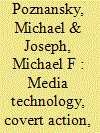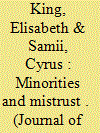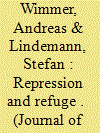|
|
|
Sort Order |
|
|
|
Items / Page
|
|
|
|
|
|
|
| Srl | Item |
| 1 |
ID:
159749


|
|
|
|
|
| Summary/Abstract |
The literature on environmental peacemaking argues that cooperation in the face of shared environmental challenges can facilitate further cooperation, trust building, and eventually peace between states in conflict. Empirical research on environmental peacemaking, predominantly conducted in the form of single case studies, has so far been inconclusive. This article uses a cross-case, multimethod research design to test the environmental peacemaking proposition. More specifically, it argues that the conclusion of a cooperative environmental agreement can have a positive impact on reconciliation between rival states. Based on a new dataset on international rivalry termination, transboundary protected areas, and international freshwater agreements, this article first conducts a statistical analysis and a qualitative comparative analysis (QCA). The results are then verified and refined by six case studies. Triangulation of findings from the three studies suggests that the conclusion of a cooperative environmental agreement facilitates reconciliation in international rivalries. But this effect is contingent on a number of scope conditions, such as high environmental attention, internal political stability, wider patterns or traditions of environmental cooperation, and already ongoing processes of reconciliation. Still, the findings imply that environmental challenges do not only affect peace and security in a negative way. Addressing them jointly also opens opportunities for peacemaking and peacebuilding between states.
|
|
|
|
|
|
|
|
|
|
|
|
|
|
|
|
| 2 |
ID:
159747


|
|
|
|
|
| Summary/Abstract |
States wishing to use force in the modern era frequently face strong incentives to exploit secrecy. Successful covert operations can reduce the likelihood of unwanted escalation with powerful rivals and help leaders conceal unpopular actions from domestic and foreign audiences alike. The many benefits of secrecy, however, can only be realized if covert operations remain covert. We argue that access to information and communications technologies (ICTs) is a critical factor that increases the chances that a covert mission will be exposed. As a result, leaders are much less likely to reach for the quiet option when a potential target has dense ICT networks. We illustrate our mechanism through US national security archival vignettes. We test our argument using a dataset of declassified US military and electoral interventions intended to subvert incumbent regimes throughout the Cold War. The core finding, that leaders are less likely to pursue covert action relative to alternative options when the chances of exposure are high, holds across five distinct measures of ICT networks as well as different model specifications and placebo tests. Our findings suggest that Cold War-style covert operations may well be a thing of the past in an age where communication and media technologies have proliferated to the far corners of the globe. We advance debates on communications technologies, covert action, and political violence.
|
|
|
|
|
|
|
|
|
|
|
|
|
|
|
|
| 3 |
ID:
159745


|
|
|
|
|
| Summary/Abstract |
An enduring debate in the conflict management literature concerns the wisdom of recognizing versus avoiding reference to ethnic identities in institutions to manage ethnic conflict. Understanding why ethnic recognition occurs is crucial for informing this debate. We develop a theory based on functional and political mobilization effects of recognizing ethnic groups. Contrary to reasoning that minority leaders would be most interested in recognition, the theory suggests that recognition consistently favors the interests of leaders from larger, plurality groups, whereas minority leaders face a ‘dilemma of recognition’ between functional gains and mobilization threats. We use mixed methods to test our theory. For our quantitative analysis, we draw on an original coding of recognition in constitutions and comprehensive political settlements from 1990 to 2012. We find that for cases with leaders from plurality groups, recognition is adopted 60% of the time. With leaders from minority groups, the rate is about 40 percentage points lower, even after accounting for many background factors. Additional quantitative tests and a qualitative analysis present more detailed evidence to show that the processes correspond to the logic of our theory. Answering these questions about when and why recognition is adopted is a crucial step in evaluating its effects on conflict.
|
|
|
|
|
|
|
|
|
|
|
|
|
|
|
|
| 4 |
ID:
159750


|
|
|
|
|
| Summary/Abstract |
Is the acquisition of personnel for UN peacekeeping missions susceptible to free-riding by UN member states? If so, what drives this behavior and what impact does this have on obtaining required personnel for the mission? Using data from 21 missions in 13 African countries between 1990 and 2010, this article addresses whether UN peacekeeping missions experience a shortfall in personnel due to incentives to free-ride by contributing states. It argues that as the number of states contributing to a mission increases, contributors have a greater incentive to free-ride and make suboptimal personnel contributions, leading to greater overall shortfall in the mission’s personnel. However, this free-riding behavior can be mitigated by the economic incentives of contributor states. The findings support two central tenets of collective action theory: that free-riding by member states contributing to the mission is more prevalent when the number of contributors is larger, and when selective incentives such as economic gains are lower. These findings have implications for the strategic composition and efficacy of peacekeeping forces. More broadly, the results underscore the struggle of international organizations to obtain compliance from member states in achieving their international objectives.
|
|
|
|
|
|
|
|
|
|
|
|
|
|
|
|
| 5 |
ID:
159746


|
|
|
|
|
| Summary/Abstract |
This article asks why ethnic exclusion from executive-level state power leads to armed conflict in some cases but not in others. To resolve this puzzle, it focuses on the possible role of five additional, qualitatively coded factors that have been considered by either grievance or opportunity theories of civil war but for which quantitative data are not readily available. To assess the combined relevance of these factors, the authors use qualitative comparative analysis (QCA) to explore the diverging conflict trajectories of 58 ‘most similar’ ethnic groups. These groups have a uniformly high conflict propensity because they are politically excluded, situated in poor countries, live geographically concentrated, and comprise substantial parts of the population; yet, only 25 of them actually experienced violent conflict. The results show that the resentment created by ethno-political exclusion translates into violent conflict if the state reacts against initial protests and mobilization with indiscriminate violence, and if there is a refuge area either within or outside the country that allows regime opponents to organize armed resistance. Moreover, a more processual analysis of conflict dynamics reveals that the conditions conducive to ethnic rebellion appear in a particular temporal sequence with a clear and universal escalation pattern.
|
|
|
|
|
|
|
|
|
|
|
|
|
|
|
|
| 6 |
ID:
159748


|
|
|
|
|
| Summary/Abstract |
How do natural disasters affect rebel group recruitment? Some influential research to date suggests that natural disasters – by lowering the opportunity cost of joining an armed movement – are likely to facilitate rebel group recruitment. In contrast, this study argues that natural disasters can negatively affect rebel organization and their recruitment efforts. It posits that natural disasters may weaken rebel groups in two main interrelated ways: (1) by leading to acute scarcity for rebel combatants and supporters, weakening the rebel group’s organizational structure and supply lines, and (2) by increasing government and international presence in areas where the insurgents operate. Empirically, this article explores these suggested mechanisms in two cases of natural disasters in the Philippines (typhoons Bopha in 2012 and Haiyan in 2013), which affected regions partially controlled by the communist rebel group, the New People’s Army (NPA). Based on data from extensive fieldwork, there is no evidence suggesting a boom in rebel recruitment in the wake of the typhoons. Rather, the NPA was temporarily weakened following the tropical storms, significantly impacting the civil war dynamics in the Philippines.
|
|
|
|
|
|
|
|
|
|
|
|
|
|
|
|
| 7 |
ID:
159751


|
|
|
|
|
| Summary/Abstract |
The UN has placed rhetorical emphasis on the prevention of armed conflict before it starts and has taken selective action toward that end. What determines where the UN gets involved? We examine UN preventive actions by focusing on UN Security Council (UNSC) resolutions in self-determination (SD) disputes. We argue that UN decisionmakers consider at least three factors when deciding where to target preventive action: the dispute’s conflict history, the potential for regional contagion, and the characteristics of the dispute. We further argue that the political dynamics of UNSC decisionmaking constrain the UN’s ability to pay attention to the third factor (the characteristics of the dispute). We test this argument using data on all UNSC resolutions comprising the authorization of diplomatic engagement, condemnation, the authorization of sanctions, and the deployment of force targeted toward SD disputes from 1960 to 2005. We find that the UN is much more likely to act in nonviolent disputes that have a history of violence and in disputes with a potential for regional contagion. The analysis shows that, while political barriers likely restrict the ability for the UNSC to act when dispute-level characteristics suggest armed conflict is more likely, the UN does act proactively to prevent violence, rather than just reactively responding to existing violence.
|
|
|
|
|
|
|
|
|
|
|
|
|
|
|
|
|
|
|
|
|